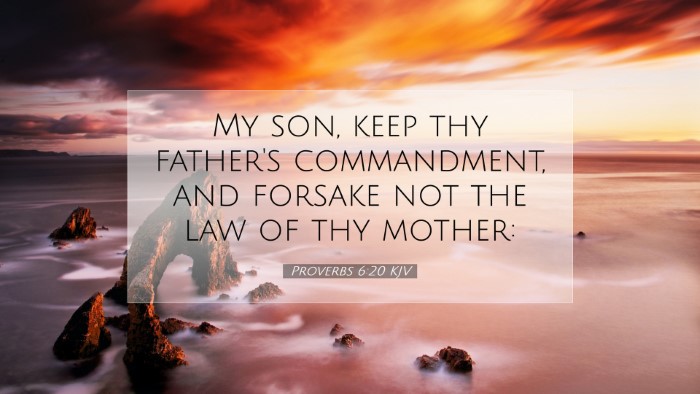Commentary on Proverbs 6:20
Proverbs 6:20 states:
"My son, keep thy father's commandment, and forsake not the law of thy mother."
This verse serves as an important reminder of the significance of familial wisdom and guidance in the life of the believer. The command to "keep" and "forsake not" carries profound implications for the relationship between children and their parents, especially in the context of spiritual and moral instruction.
1. The Role of Parental Authority
According to Matthew Henry, this verse emphasizes the need for children to respect and adhere to the teachings of their parents. The authority of the father and mother in conveying moral law is paramount:
- Parental Commandment: The father's commandment represents wisdom and authority, which is to be honored and followed.
- Law of the Mother: The mother's law signifies the nurturing aspect of parental instruction, underscoring the comprehensive nature of guidance that encompasses both discipline and care.
Henry elaborates that parents’ commandments often encapsulate the teachings of Scripture, representing a divine authority that is transferred to the familial context.
2. The Importance of Obedience
Albert Barnes notes that obedience to parental authority is an essential virtue that leads to wisdom and understanding. He emphasizes the necessity of heeding parental advice as it can provide a foundation for moral and ethical living:
- Spiritual Growth: By adhering to parental commands, children establish a character aligned with the virtues of faith.
- Prevention of Sin: Barnes argues that following the wisdom imparted by parents helps steer children away from sinful paths and harmful decisions.
This obedience is not merely a duty but a pathway to spiritual blessings, as children who honor their parents are promised long life and peace.
3. The Collective Wisdom of Family
Adam Clarke highlights the synergy between the teachings of both parents. He emphasizes that the commands of the father and the laws of the mother are not isolated but should be viewed as complementary:
- Unity in Instruction: Clarke points out that both parents play a pivotal role in providing a balanced perspective on life, fostering strong moral fortitude.
- The Influence of Spiritual Narratives: By instructing their children in the ways of the Lord, parents equip them with a narrative that acknowledges divine intervention in their moral framework.
This collaboration enables children to have a well-rounded view of the commandments needed for successful living.
4. Implications for Modern Readers
The teachings found in Proverbs 6:20 resonate strongly with modern readers, particularly with those ministering to youth and families:
- Encouraging Family Discipleship: Today's pastors and leaders are encouraged to promote family discipleship, reinforcing the role of parents in spiritual education.
- Addressing the Breakdown of Authority: In a contemporary context, where paternal and maternal authority may be undermined, this verse serves as a clarion call for restoring respect for parental guidance.
By fostering environments where parental wisdom is treasured, churches can bolster the spiritual development of the next generation.
5. Conclusion
Proverbs 6:20 encapsulates a vital principle of honoring parental authority and valuing the moral teachings imparted by both fathers and mothers. This verse not only serves as a directive for the younger generation but also encourages parental responsibility in nurturing and guiding their children toward righteousness:
- Heritage of Wisdom: Children who respect and adhere to the teachings of their parents will find a rich heritage of wisdom.
- Divine Connection: The act of heeding parental commandments is an acknowledgment of the divine institution of family.
Ultimately, embracing the words of Proverbs 6:20 can lead to a life marked by blessing, understanding, and righteousness, essential for fulfilling the Christian calling.


